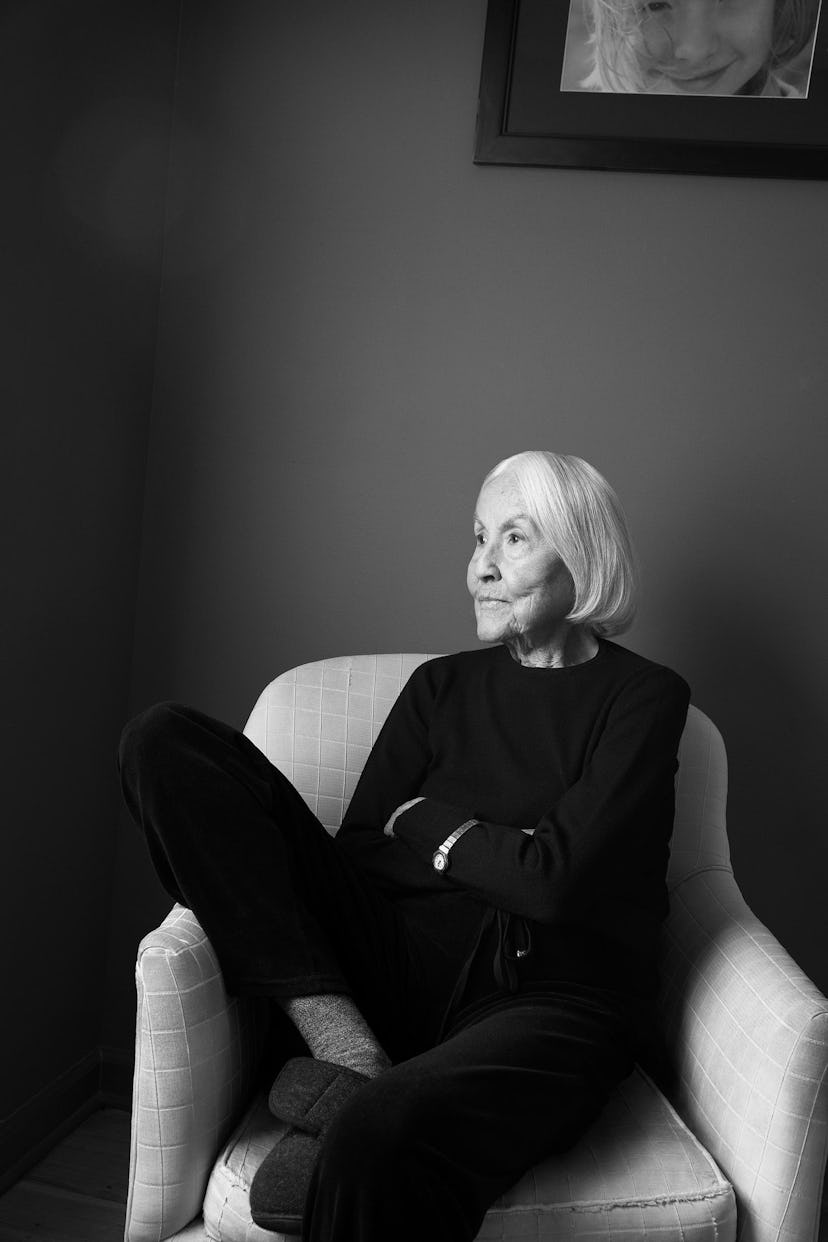Stylist and Fashion Editor Polly Mellen Dies at 100

Polly Allen Mellen, the effusive American stylist and fashion editor, has passed away at the age of 100. Once described by The New York Times as “the last link to the great old-fashioned fashion editors,” she will be remembered for her unique approach to style. Known to cry and clap when collections truly moved her, her expressiveness stood out in a front row otherwise filled with poker faces. She also mentored numerous influential editorials during her time at Vogue and Allure, specifically with her longtime friend and collaborator Richard Avedon, and her boss at Vogue, Diana Vreeland. In fact, Avedon once made the quip, “From Vreeland's rib came Polly Mellen.”
Mellen was born Polly Allen in West Hartford, Connecticut in 1924 to parents she described as “enormously chic.” Mellen had an interest in fashion from a young age, inspired by the clothes her mother made for her dolls, as well as the movie stars of the time, including Greta Garbo, Marlene Dietrich, and Fred Astaire. She was educated at Miss Porter’s in Farmington, Connecticut, a private college prep school that also counted Jacqueline Kennedy as an alumna. During her time there, her love for style only grew. “I'd wear my sweaters backward or tie my shoes with red laces,” she told the New York Times in 1994. “Looking like everybody else bored me.”
Allen and Avedon in 1994.
After school, Mellen went on to work as a nurse’s aide in a soldier’s hospital in Virginia during the Second World War. She later moved to New York where she began her career in fashion, initially as a salesgirl at Lord & Taylor. In 1950, Mellen got a job as a fashion editor at Mademoiselle. Not long after, she secured an interview at Harper’s Bazaar thanks to a friend from Lord & Taylor, Sally Kirkland. Vreeland, the magazine’s editor-in-chief at the time, took Mellen under her wing. “I think she recognized the passion and the energy I had,” Mellen told Nicolas Ghesquière in 2010.
It was Vreeland who first introduced Mellen to Avedon, but at first, the pair didn’t get along. “When I was moved, I expressed myself. And I guess it was a bit much for Dick,” Mellen said during an interview at 92Y in 2012. “He said, ‘I can’t work with her, Diana, she’s too noisy.’” Eventually relations warmed, and Avedon and Mellon collaborated many times throughout their respectively illustrious careers. “He became my best friend in the fashion world,” she said. Funny enough, Mellen herself would later become known for requiring silence on set. “It didn’t have to do with me—it had to do with the photographer,” she insisted to W earlier this year.
Just two years after starting at Harper’s, Mellen got married and moved to Philadelphia where she welcomed two children with her then-husband. After eight years, the pair parted ways. In 1965, she married Henry Mellen, a printing company executive, who she was with until his death in 2014.
It was in 1967 that Mellen joined Vreeland at Vogue. She began her tenure at the magazine with a five-week photoshoot in Japan with Avedon and Veruschka, called “The Great Fur Caravan,” considered the most expensive fashion editorial ever. It was one of the many notable stories Mellen worked on during her time at Vogue. In 1991, she moved to Allure to take on the role of creative director. Mellen was a famously demanding boss, known for the refrain, “No is not an answer.” She also had an eye for new talent, and would often be one of two dozen or so people checking out an emerging designer at an off-hours show in a far-off location. Of course, if she liked something, she would let it be known with her resounding claps. In fact, Geoffrey Beene once called Mellen, “the industry’s cheerleader.”
In 1994, the Council of Fashion Designers of America honored Mellen with a lifetime achievement award. She felt she was too young for such a prize at 68, though she considered it one of the most rewarding moments in her career. Mellen left Allure in 1999 and freelanced for two years before officially retiring in 2001 to her home in South Kent, Connecticut. “I really didn’t want to do mediocre stuff, which is what a lot of the projects I was offered were,” Mellen told W about her decision to retire. “I said to myself, ‘That’s it. Go to the country, be with your family, and live a life, rather than mediocrity.’”
Mellen was always outspoken, never afraid to share her opinion of a collection or the state of the industry. Her influence continues to live on in the pages of fashion magazines, and within the industry as a whole. But Mellen didn’t like living in the past, and preferred to look toward the future. “Let’s not be nostalgic,” she told W. “Let’s not talk about what it used to be. Always forward.”